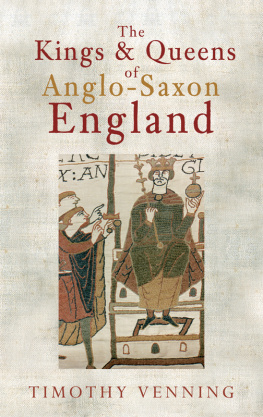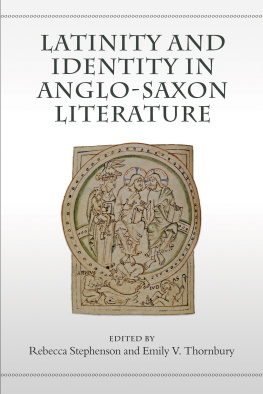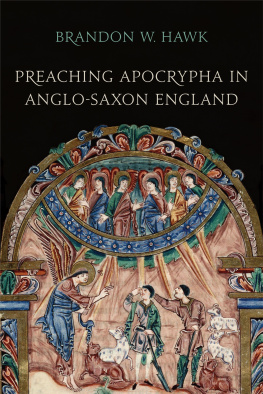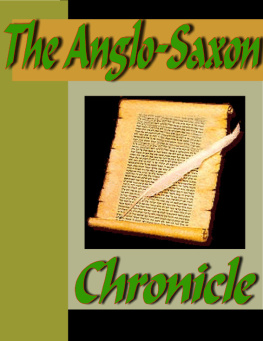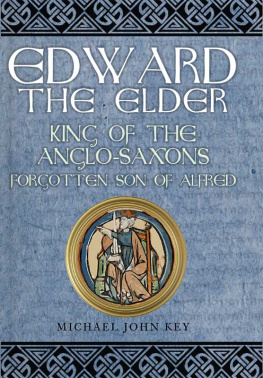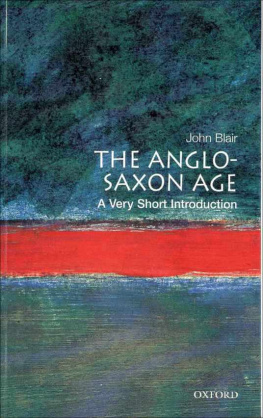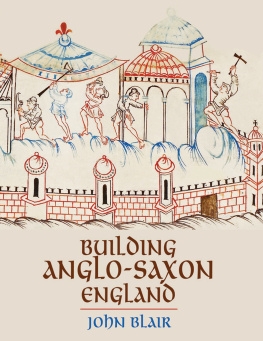Acknowledgements
Over the course of researching and writing this book we have accumulated countless debts to friends and colleagues happily, not mutually exclusive categories. They cannot all be named in the space we have, but we offer to everyone our most sincere thanks.
Some particular debts need to be specifically acknowledged, however. We are most grateful to the University of Manchester for granting Nick a sabbatical in 20092010 and to the Leverhulme Trust for awarding him a Leverhulme Research Fellowship in 2010. We have benefited enormously over the years from the unstinting aid and advice of colleagues past and present at the University of Manchester including the late Jeff Denton, the late David Hill, Kate Cooper, Paul Fouracre, Conrad Leyser, Stephen Mossman, Gale Owen-Crocker, Stephen Rigby, Alex Rumble and Donald Scragg. We would also like to thank the numerous members of the Manchester Centre for Anglo-Saxon Studies and the Centre for Late Antiquity at the University of Manchester. Generations of students at Manchester have been unwitting guinea pigs for many of the ideas in this book and we thank them for this and for the stimulus they have provided through their questions, suggestions and comments.
Paul Fouracre generously read and commented on and we thank Murray Cook for providing information about the Viking-Age burials at Cumwhitton and for supplying us with notes from a symposium on the burials. Jonathan Jarrett, and Allan McKinley have generously shared their expertise in early medieval diplomatic, and much else, on numerous occasions, as well as allowing us to read material not yet published that has assisted greatly with numerous chapters. Discussions with Morn Capper on the kingdom of Mercia have likewise improved many of the chapters. Luca Larpi provided invaluable assistance with Latin and palaeography, as well as sharing his extensive knowledge of Gildas and the De excidio.
. Pauline Stafford kindly shared with us her considerable expertise on the Anglo-Saxon Chronicle, particularly the Annals of thelfld.
James Gerrard very helpfully discussed several issues regarding the fifth century and in particular late Roman Bath and Southwark, and Gary Brown generously supplied .
We are grateful to Bryan Sitch for the opportunity to view the skeletal remains from early excavations at Heronbridge held by Manchester Museum and provision of . We must also thank the St Edward Brotherhood at Brookwood, Surrey for permission to photograph the shrine of St Edward and for their kind hospitality when visiting.
All errors of fact, misconceptions and mistakes, however, remain solely our responsibility.
We also thank Heather McCallum, the rest of the staff at Yale University Press in particular Tami Halliday, Katie Harris, Steve Kent, Jessica Lee and Rachael Lonsdale our illustrator, Martin Brown, and our copy-editor, Richard Mason, for the considerable effort and care they have put into this volume and for the assistance they have given us at all stages of the process.
Our greatest debt, as ever, is to our families, particularly Cheryl and Rosa: this book is for them.
BIBLIOGRAPHY
Abbreviations
A.S.E. Anglo-Saxon England (journal)
A.S.S.A.H. Anglo-Saxon Studies in Archaeology and History
E.H.R. English Historical Review
E.M.E. Early Medieval Europe
M.A. Medieval Archaeology
T.R.H.S. Transactions of the Royal Historical Society
Bibliographies
The journal Anglo-Saxon England publishes a bibliography of all aspects of Anglo-Saxon studies, the Old English Newsletter similarly publishes a guide, The Years Work in Old English Studies and a bibliography. The journal Medieval Archaeology offers a report of recent archaeological discoveries: Medieval Britain and Ireland. The British Numismatic Society publishes an annual Journal that frequently includes information about new coin finds, as does the Spink Numismatic Circular, and the annual Numismatic Chronicle of the Royal Numismatic Society. The most detailed single-volume bibliography is Simon Keynes, Anglo-Saxon England: A Bibliographical Handbook for Students of Anglo-Saxon History, 7th edn (Cambridge, 2006), which is copiously annotated and authoritative.
Select Bibliography
General Works
J. Blair, The Anglo-Saxon Age: A Very Short Introduction (Oxford, 2000): offers a very brief history covering the key events and people.
J. Campbell, ed., The Anglo-Saxons (London, 1982): a multi-authored, richly illustrated history of the whole period.
T. Charles-Edwards, ed., After Rome (Oxford, 2003): thematic essays by leading scholars exploring pre-Viking Britain and Ireland.
W. Davies, ed., From the Vikings to the Normans (Oxford, 2003): part of the same series as Charles-Edwards, above, and offering the same width and depth.
R. Fleming, Britain after Rome: The Fall and Rise, 400 to 1070 (London, 2010): a lively and engaging study, drawing particularly on material culture and primarily focusing on the Anglo-Saxon kingdoms.
D. Hill, An Atlas of Anglo-Saxon England (London, 1981): maps illustrating key areas, events and themes.
E. James, Britain in the First Millennium (London, 2001): particularly strong on the pre-Viking period, offering an island-wide perspective.
M. Lapidge, J. Blair, S. Keynes and D. Scragg, eds, The Blackwell Encyclopaedia of Anglo-Saxon England (Oxford, 1999): short essays on all aspects of Anglo-Saxon studies by many of the top scholars.
H. Loyn, The Governance of Anglo-Saxon England 5001087 (London, 1984): a detailed but readable administrative history.
The New Cambridge Medieval History (Cambridge, 19952004): essays exploring the whole of medieval Europe; volumes 14 cover the Anglo-Saxon period and include authoritative discussions of the material.
P. Stafford, Unification and Conquest: A Political and Social History of England in the Tenth and Eleventh Centuries (London, 1989): combines an insightful political narrative with thematic sections exploring the later Anglo-Saxon period.
P. Stafford, ed., A Companion to the Early Middle Ages: Britain and Ireland c. 5001100 (Oxford, 2009): a series of important essays that sets Anglo-Saxon England in its wider context.
F. M. Stenton, Anglo-Saxon England, 3rd edn (Oxford, 1971): first published in 1943, this classic account shows its age but is still a rewarding read.
A. Williams, Kingship and Government in Pre-Conquest England (Basingstoke, 1999): a narrative history focusing on royal authority and government.
B. Yorke, The Anglo-Saxons (Sutton, 1999): a Pocket History of the Anglo-Saxon period; brief but eminently readable.
Handbooks and Guides
J. Backhouse, D. H. Turner and L. Webster, eds, The Golden Age of Anglo-Saxon Art, 9661066 (London, 1984): extended catalogue of an exhibition by the British Museum and British Library, richly illustrated.
M. Brown, Manuscripts from the Anglo-Saxon Age (London, 2007): 140 plates of the most important manuscripts plus expert commentary.
J. Crick and E. van Houts, eds, A Social History of England, 9001200 (Cambridge, 2011): learned but readable essays discussing areas all too easily overlooked.
R. Gameson, ed., The Cambridge History of the Book in Britain: Volume 1, c. 6001100 (Cambridge, 2011): essays covering book production, ownership and use, with studies of particular types.
M. Gelling, Signposts to the Past


